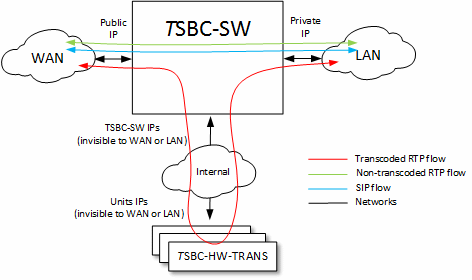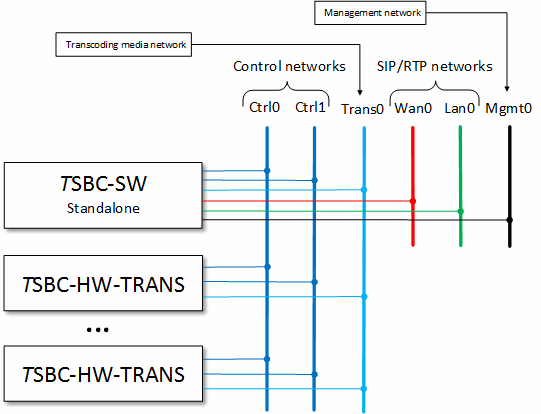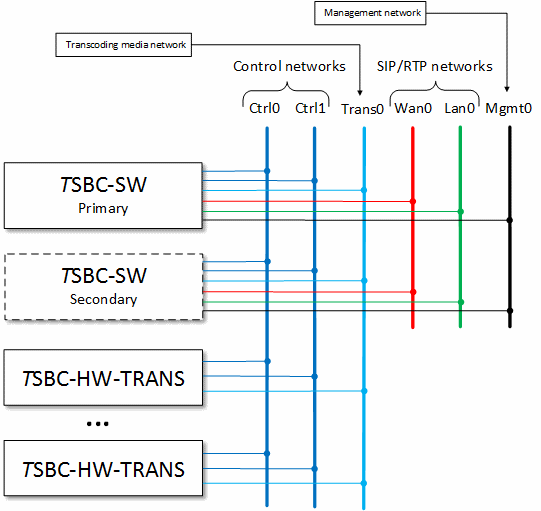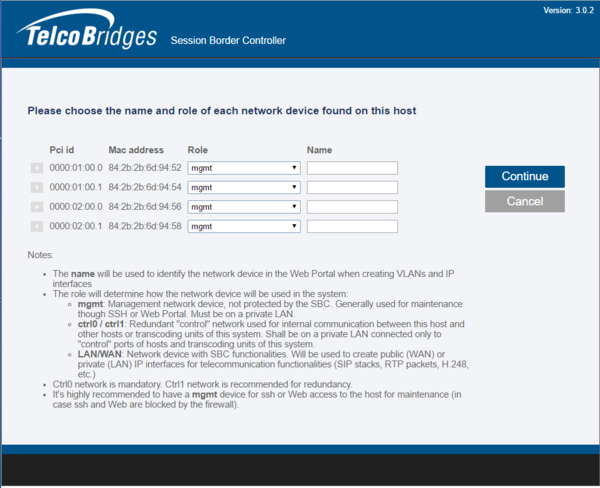FreeSBC:Transcoding and Network Setup
William Wong (Talk | contribs) (→Requirements) |
William Wong (Talk | contribs) (→Requirements) |
||
| Line 7: | Line 7: | ||
FreeSBC with transcoding deployments require a minimum of three networks for initial configuration. The first network will be used as a local management interface to access the instance using the web portal (HTTP/HTTPS) and SSH access. The second network will transport the actual incoming and outgoing VoIP streams (signaling and media) that the FreeSBC will process. The third network will be used as a control interface connecting to another host in FreeSBC 1+1 configuration or transcoding units in the system for control purpose. | FreeSBC with transcoding deployments require a minimum of three networks for initial configuration. The first network will be used as a local management interface to access the instance using the web portal (HTTP/HTTPS) and SSH access. The second network will transport the actual incoming and outgoing VoIP streams (signaling and media) that the FreeSBC will process. The third network will be used as a control interface connecting to another host in FreeSBC 1+1 configuration or transcoding units in the system for control purpose. | ||
| − | [[File:Tsbc-sw-any-networks_with_transcoding.png| | + | [[File:Tsbc-sw-any-networks_with_transcoding.png|200px]] |
== Network setups == | == Network setups == | ||
Revision as of 01:20, 20 February 2018
Contents |
Requirements
FreeSBC requires external transcoding unit supplied by Telcobridges to do transcoding between different codecs used in RTP traffic. Please see FreeSBC for more information.
FreeSBC with transcoding deployments require a minimum of three networks for initial configuration. The first network will be used as a local management interface to access the instance using the web portal (HTTP/HTTPS) and SSH access. The second network will transport the actual incoming and outgoing VoIP streams (signaling and media) that the FreeSBC will process. The third network will be used as a control interface connecting to another host in FreeSBC 1+1 configuration or transcoding units in the system for control purpose.
Network setups
Depending on the technical requirements of a particular deployment, a FreeSBC can be installed as a standalone or protected (1+1) system. These options have different network needs to fulfill their functions. In addition to redundancy, the support of external transcoding equipment with the FreeSBC also adds to the network requirements. The following section depict the different supported network configurations.
Transcoding
The FreeSBC session border controller should be the only equipment facing the different networks to ensure proper protection and monitoring. In that sense, any transcoding units deployed (TSBC-HW-TRANS) will never be visible from data networks handled by the SBC. The FreeSBC will require three internal networks to reach the transcoding units: two control networks and one media network. The control networks are the same as those deployed for redundant systems while the media network will contain all the VoIP traffic coming in or out of the transcoding units.
Standalone with transcoding
Combining the standalone network requirements to the transcoding network needs, the deployment of such a system requires multiple networks as depicted below:
1+1 with transcoding
Combining the redundant network requirements to the transcoding network needs, the deployment of such a system requires multiple networks as depicted below:
Network device discovery
Once all networks have been physically (or virtually) connected to the FreeSBC instance, the system can be started. Upon first bootup (or after an operator initiated 'network device role' reset), the FreeSBC web portal will show a network device assignation page. This page is used to identify the role of each detected devices. As described above, the role can be any of the following three: control, management or VoIP traffic (named LAN/WAN). Once the role is selected, the operator can enter a name for each. Every configured/detected physical network device will then appear as a 'physical port' in the 'IP Interace' tab in the web portal.
The operator can click on the '+' sign to get more information about a specific network device. These information are helpful to match detected networks with the real network based on these characteristics (IP, driver type, etc).
For configuring Transcoding unit on FreeSBC, please see Toolpack:Tsbc IP Network Settings 3.0




